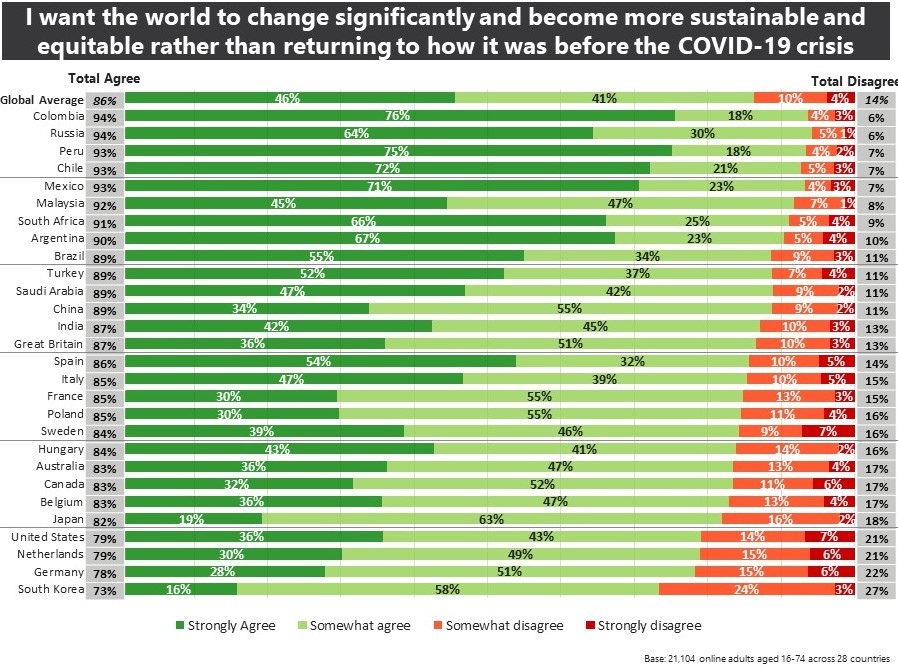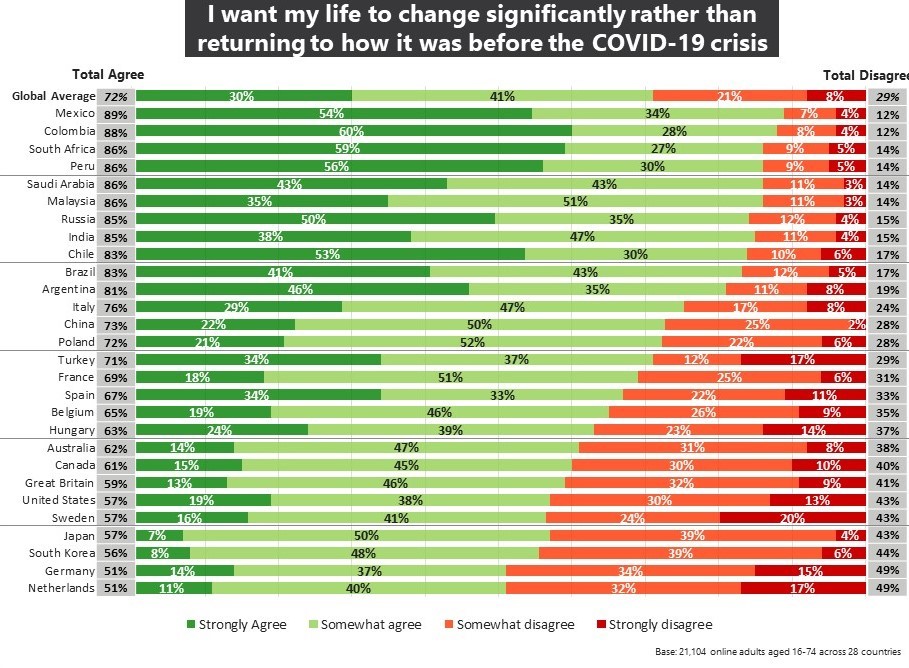Eight in ten Australians yearn for significant change rather than a return to a “pre-COVID normal” – Ipsos survey
There is a profound and widespread desire for change rather than a return to how things were before the COVID-19 pandemic, a new global Ipsos survey for the World Economic Forum unveiled.
The survey of more than 21,000 adults from 27 countries finds that globally 72% would prefer their life to change significantly rather than go back to how it was before the COVID-19 crisis started. Further, 86% would prefer to see the world change significantly – and become more sustainable and equitable – rather than revert to the status quo ante.
Key Findings for Australia
- In Australia, 83% agreed they want the world to change significantly to become more sustainable and equitable, with 36% strongly agreeing and 47% somewhat agreeing. This places us below the global average (86%) and in the bottom 10 countries on this measure.
- Interestingly, females (41%) and those under 35 years of age (43%) were most likely to strongly agree, while low income households also stood out but at the total agreement level of 88%.
- While the vast majority of Australians surveyed want change in the world, the figure desiring change in their own lives is much smaller, with 62% agreeing with the statement: “I want my life to change significantly and want the world to change significantly and become more sustainable and equitable rather than returning to how it was before the COVID-19”.
- Those aged under 35 years were most likely to desire change in their own life (75%), compared with 61% of those aged 35-49 years and 52% of those aged 50-74 years.
Key Global Findings
Nearly nine in ten want the world to change instead of returning to how it was
Globally, 86% of all adults surveyed agree that, “I want the world to change significantly and become more sustainable and equitable rather than returning to how it was before the COVID-19”. More precisely, 46% strongly agree and 41% somewhat agree with that proposition, while 14% disagree (10% somewhat and 4% strongly).
In each of the 27 countries surveyed, those who share this view outnumber those who don’t by a substantial margin – more than 50 percentage points in every country except South Korea.
Russia and Colombia top the list of countries where the desire for change is most prevalent, at 94% each. They are followed by Peru (93%) Mexico (93%) Chile (93%) Malaysia (92%), South Africa (91%) Argentina (90%), and Saudi Arabia (89%).
Countries where the preference to return to the way things were before the pandemic is strongest include: South Korea (where 27% strongly or somewhat disagree that they would like to see the status quo changed), Germany (22%), the Netherlands (21%), the United States (21%), and Japan (18%).

Three out of four globally want significant change in their own life
Across all 28 countries, 72% want their own lives to change significantly rather than return to what they were like before the COVID-19 crisis (30% strongly and 41% somewhat) while the other 29% disagree (21% strongly and 8% somewhat).
More than four in five adults throughout Latin America and in South Africa, Saudi Arabia, Malaysia, Russia and India express a desire for significant change in their personal lives after the pandemic.
By contrast, at least two out of five adults in the Netherlands, Germany, South Korea, Japan, Sweden, the U.S., Great Britain, and Canada long for their life to just return to how it was before the pandemic.

About the Study
These are the results of a 28-country survey conducted by Ipsos on its Global Advisor online platform. Ipsos interviewed a total of 21,104 adults aged 18-74 in United States, Canada, Malaysia, South Africa, and Turkey, and 16-74 in 23 other countries between August 21 and September 4, 2020.
The sample consists of approximately 1,000 individuals in each of Australia, Belgium, Brazil, Canada, China (mainland), France, Germany, Great Britain, Italy, Japan, Spain, and the U.S., and 500 individuals in each of Argentina, Chile, Colombia, Hungary, India, Malaysia, Mexico, the Netherlands, Peru, Poland, Russia, Saudi Arabia, South Africa, South Korea, Sweden, and Turkey.
The samples in Argentina, Australia, Belgium, Canada, France, Germany, Great Britain, Hungary, Italy, Japan, the Netherlands, Poland, South Korea, Spain, Sweden, and the U.S. can be taken as representative of these countries’ general adult population under the age of 75.
The samples in Brazil, Chile, China (mainland), India, Malaysia, Mexico, Peru, Russia, Saudi Arabia, South Africa, and Turkey are more urban, more educated, and/or more affluent than the general population. The survey results for these countries should be viewed as reflecting the views of the more “connected” segment of their population.
The data is weighted so that each country’s sample composition best reflects the demographic profile of the adult population according to the most recent census data.
Where results do not sum to 100 or the ‘difference’ appears to be +/-1 more/less than the actual, this may be due to rounding, multiple responses or the exclusion of don't knows or not stated responses.
The precision of Ipsos online polls are calculated using a credibility interval with a poll of 1,000 accurate to +/- 3.5 percentage points and of 500 accurate to +/- 4.8 percentage points.

